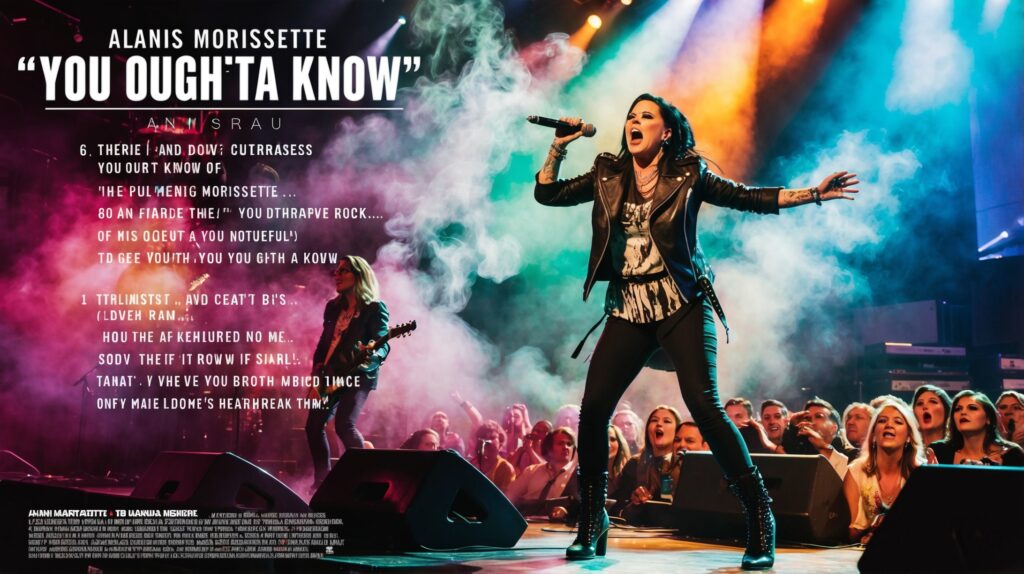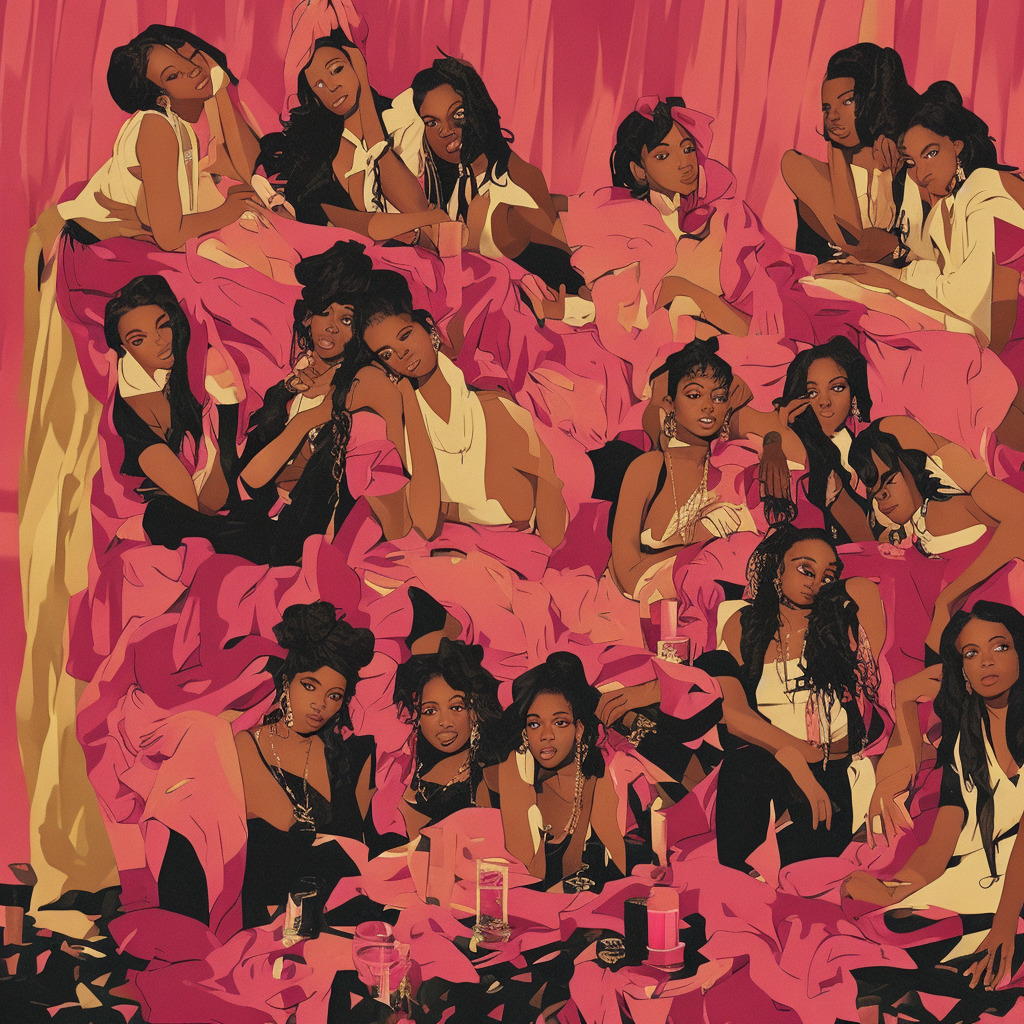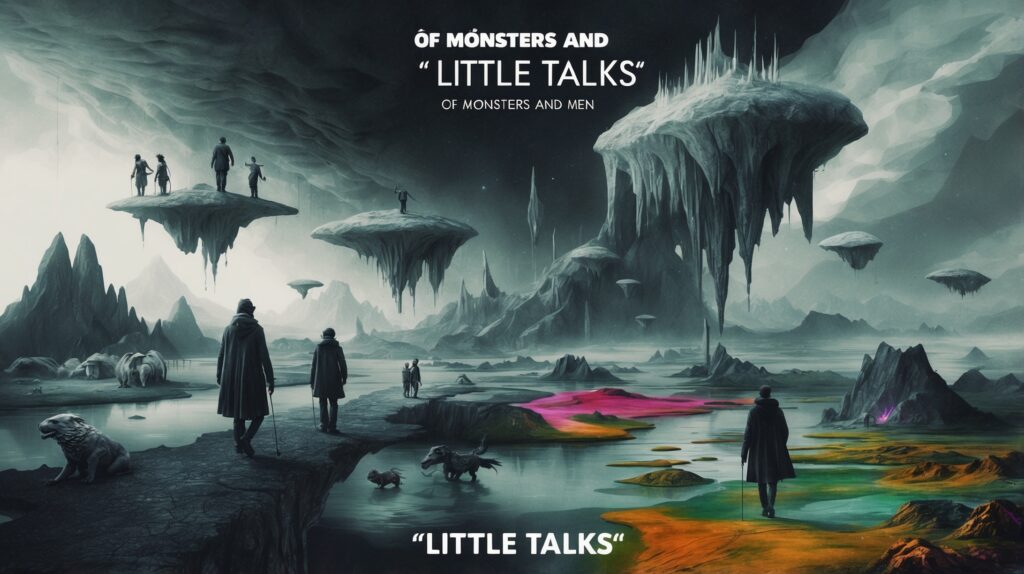Alanis Morissette: A Defining Voice of the ’90s
Explore the journey of Alanis Morissette, the artist behind ‘You Oughta Know’. Discover how this iconic track marked a pivotal moment in her career during the vibrant alt-rock era of the 1990s.

Alanis Morissette is a name that echoes loudly throughout the alt-rock corridors of the 1990s, a period when her raw, unapologetic sound helped redefine the music landscape. Known for her emotive delivery and introspective lyrics, Morissette quickly emerged as a formidable force in music, with ‘You Oughta Know’ standing as one of her most iconic tracks. This song not only established her as a household name but also marked a pivotal moment in her flourishing career.
Born in Ottawa, Canada, in 1974, Morissette ventured into the world of music at a young age. Her early work was a mix of pop-oriented tracks, yet her move to Los Angeles in the early ’90s marked a turning point. It was during this transformative era that Morissette developed her unique voice, layered with the emotional intensity and vulnerability that would soon captivate audiences worldwide.
When ‘You Oughta Know’ was released in 1995 as a part of her groundbreaking album ‘Jagged Little Pill’, it received immediate attention for its raw emotion and candidness. At that time, the music scene was burgeoning with grunge and alternative rock, genres that resonated with Morissette’s new direction. Collaborating with producer Glen Ballard, she was able to channel her personal experiences into lyrics that were both confessional and empowering, setting the stage for her continued success and influence in music.
Glen Ballard: A Key Architect Behind ‘You Oughta Know’
Explore Glen Ballard’s significant contributions as the composer behind ‘You Oughta Know’, detailing his background, musical style, and impact on the song’s success.

Background and Career: Glen Ballard emerges as an eminent figure in the music industry, celebrated for his multifaceted contributions as a songwriter, producer, and composer. Born in Natchez, Mississippi, Ballard’s musical journey began with his early fascination with the piano. With a formal education at LSU College of Music, he transitioned into the professional realm, making his mark through collaborations with industry icons like Michael Jackson and Quincy Jones. Notably, his co-writing work on Michael Jackson’s ‘Man in the Mirror’ showcased his exceptional ability to blend heartfelt lyricism with compelling melodies.
Musical Style and Influences: Ballard is renowned for his versatile musical style that seamlessly weaves elements of pop, rock, and alternative music. Influenced by the intricacies of classic rock and soul, his compositions often feature strong emotional undertones and robust instrumental arrangements. His collaborations with a range of artists reflect a dynamic adaptability, yet his signature lies in crafting memorable hooks and emotional depth that resonates universally, as evidenced in his work with Alanis Morissette.
Role in ‘You Oughta Know’: In the creation of ‘You Oughta Know’, Ballard played a pivotal role alongside Alanis Morissette in sculpting the visceral sound and raw energy that define the track. His keen sense of musical storytelling allowed for the integration of Morissette’s poignant lyrics into a powerful sonic framework that brought out the song’s emotional intensity. Ballard’s influence can be heard in the gritty guitar riffs and dynamic shifts, which underpin the song’s theme of betrayal and empowerment, marking it as a standout anthem of the 90s.
Honors, Impact, and Tributes: Recognizing ‘You Oughta Know’
You Oughta Know’ has achieved critical acclaim, winning a Grammy Award, inspiring covers by stars like Beyoncé, and appearing in movies and TV shows, ensuring its enduring cultural impact.

There is no denying the seismic impact of Alanis Morissette’s ‘You Oughta Know’ since its release in 1995. This iconic anthem has not only earned critical acclaim but has also attracted numerous honors, including award nominations and wins that speak to its lasting significance. At the 1996 Grammy Awards, ‘You Oughta Know’ was nominated for Best Rock Song and Best Female Rock Vocal Performance, taking home the gramophone for the latter, which attests to its powerhouse vocal delivery and raw emotional resonance. The Grammy was a solid testament to Morissette’s expansive reach and the song’s indisputable place in 90s rock history.
The song’s influence extends beyond award shows, spilling into mainstream culture in various creative forms. Its potency and emotional depth have inspired numerous artists to offer their interpretations. One notable cover came from Beyoncé, who infused her undeniable star power into a live rendition during her 2009 ‘I Am… World Tour’. Additionally, ‘You Oughta Know’ was covered on the hit TV show Glee, bringing the song’s intense emotional core to a new generation of fans while helping keep its legacy alive through modern pop culture channels.
‘You Oughta Know’ has also left its mark on the entertainment industry, with appearances in films, TV shows, and other media. The song’s gripping narrative of heartbreak and empowerment makes it a perfect fit for soundtracks requiring intense emotional punch. These features have cemented ‘You Oughta Know’ as a staple for expressing raw emotion and female empowerment in popular media.
Chart Success: The Power of “You Oughta Know”
“You Oughta Know” skyrocketed up the charts, marking a breakthrough for Alanis Morissette with its raw energy and emotional depth. It became a cultural touchstone, earning critical acclaim and significant airplay.

“You Oughta Know” was released on July 6, 1995, as the lead single from Alanis Morissette’s third studio album, ‘Jagged Little Pill’. This song marked a pivotal moment in Alanis’s career, quickly capturing the attention of audiences worldwide. Initially debuting at modest positions, it soon climbed the charts, reaching number six on the Billboard Hot 100 Airplay chart and number one on the U.S. Modern Rock Tracks chart. Its success was unprecedented for a female-led alt-rock song at the time, paving the way for future artists in the genre.
Compared to other tracks on the charts during its peak, “You Oughta Know” stood out for its raw emotion and unapologetic lyrics, offering a refreshing contrast to the prevalent pop tunes of the mid-90s. This song was a breakthrough hit for Alanis Morissette, representing a sharp departure from her previous pop-oriented releases in Canada. It signaled her evolution as an artist and showcased her ability to create intensely personal yet universally resonant music. The song’s success was instrumental in Alanis’s ascension to international stardom, solidifying her place in the music industry.
The marketing strategies employed for “You Oughta Know” were pivotal in its success. Maverick Records, Alanis’s label at the time, capitalized on the song’s raw energy and unique sound. With a series of memorable live performances, including a lauded appearance on “The David Letterman Show”, and heavy rotation on music channels like MTV, the song garnered significant attention. Critically acclaimed for its boldness, “You Oughta Know” received two Grammy Awards in 1996, further cementing its status as a significant cultural moment. Its impact continues to resonate, influencing countless artists and retaining its status as an anthem of empowerment and emotional honesty.
A Visual Journey of Emotions
“You Oughta Know” lacks an official music video, but fan-made and live performance videos fill the gap, capturing the song’s raw and intense emotional landscape.

Although there isn’t an official music video for Alanis Morissette’s iconic song “You Oughta Know,” the power of her performance is captured vividly through various live performances and fan-made videos that amplify the raw emotion embedded in the song. Alanis often performs this track with intense emotional energy, which captivates her audiences, and this same emotive fervor is mirrored across numerous fan-produced videos circulating on platforms like YouTube. These creations harness creative visuals, using clips from Morissette’s live performances, as well as dramatic imagery that align with the song’s themes of heartbreak and betrayal.
The absence of an official music video has not deterred the song’s popularity or the creativity of its audience. Instead, viewers take advantage of the song’s dynamic storytelling to create visuals that convey the vivid emotional depth of the song. These videos often focus on themes of heartache, anger, and empowerment, using visuals inspired by the song’s intense lyrical content. It’s a testament to the song’s enduring impact that so many different interpretations can exist, each reflecting the personal connection and emotional response of its creators.
Critical reception of these alternative videos highlights their contribution to maintaining the song’s relevance over decades. While official music video production typically involves famous directors and industry professionals, these fan-made versions showcase a grassroots element that keeps the piece alive and contemporary. This phenomenon underscores the universal appeal of “You Oughta Know,” where the legacy of its intense emotional depth transcends medium, format, and time.
Unpacking the Musical Architecture: The Structure of ‘You Oughta Know’
Explore the musical structure of ‘You Oughta Know,’ where Alanis Morissette’s raw emotion meets masterful composition in an alternative rock classic.

‘You Oughta Know’ by Alanis Morissette is a masterclass in alternative rock music production, showcasing a complex yet accessible song structure that has captivated listeners since its release. The song is primarily set in the key of F# minor, a choice that lends the track its edgy and emotionally resonant sound. This key heightens the moody, intense atmosphere that underscores the song’s raw lyrical content.
The chord structure plays a significant role in conveying the song’s emotional depth. The verses utilize a progression that combines strumming guitar and electric bass, which adheres to a cyclical chord pattern, providing a steady foundation while allowing the lyrics to take center stage. The tempo of the song is moderate, adding to its intensity without overwhelming the listener, inviting them to invest emotionally in Morissette’s fervent vocal delivery.
The melody of ‘You Oughta Know’ is characterized by its wide emotional range, oscillating between restrained verses and an explosive chorus. Harmonic tension builds throughout, with dissonant notes and chromatic embellishments creating a sense of urgency and unrest. The song employs a variety of instruments, such as electric guitars, bass, drums, and subtle keyboard elements, with the guitar riffs being particularly prominent and memorable, providing a gritty texture that complements Morissette’s passionate vocals.
While ‘You Oughta Know’ stands out on its own, its placement within Morissette’s discography is noteworthy. It marks a departure from her earlier pop-infused style towards a more mature and edgy sound that characterized her ‘Jagged Little Pill’ album. This evolution signifies a pivotal moment in her career where she embraced a more authentic voice, resonating with a generation undergoing their own search for truth and emotional catharsis.
An interesting fact about the recording of ‘You Oughta Know’ is the production collaboration with Glen Ballard, a noted producer who played a significant role in shaping its sound. Recorded at the renowned Westlake Recording Studios, the sessions were known for their spontaneity and raw creativity, capturing the emotional intensity that has come to be synonymous with the track.
Decoding the Emotions and Messages in ‘You Oughta Know’
Explore the riveting lyrics of ‘You Oughta Know’ and delve into its themes of betrayal and emotional confrontation, as Alanis Morissette crafts a raw narrative filled with vivid storytelling and powerful literary devices.
I wish nothing but the best for you both
An older version of me, is she perverted like me?
Would she go down on you in a theatre?
Does she speak eloquently? And would she have your baby
I’m sure she’d make a really excellent mother
‘Cause the love that you gave that we made
Wasn’t able to make it enough for you to be open wide, no
And every time you speak her name
Does she know how you told me you’d hold me until you died
‘Til you died, but you’re still alive
And I’m here, to remind you
Of the mess you left when you went away
It’s not fair, to deny me
Of the cross I bear that you gave to me
You, you, you oughta know
…
******* This Lyrics is NOT for Commercial use *******
 Alanis Morissette’s ‘You Oughta Know’ is a fierce anthem that explores the raw emotions of heartbreak and betrayal. Released in the mid-90s, the song’s lyrics struck a chord with audiences, resonating with anyone who has experienced the turmoil of a ruptured relationship. Thematically, the song delves into themes of betrayal, loss, and indignation, conveyed through Morissette’s visceral delivery and potent words. It paints a picture of a scorned lover confronting their ex-partner, questioning the legitimacy of their feelings and actions. The personal nature of these themes allowed listeners to connect deeply, capturing the zeitgeist of a generation navigating complex emotions.
Alanis Morissette’s ‘You Oughta Know’ is a fierce anthem that explores the raw emotions of heartbreak and betrayal. Released in the mid-90s, the song’s lyrics struck a chord with audiences, resonating with anyone who has experienced the turmoil of a ruptured relationship. Thematically, the song delves into themes of betrayal, loss, and indignation, conveyed through Morissette’s visceral delivery and potent words. It paints a picture of a scorned lover confronting their ex-partner, questioning the legitimacy of their feelings and actions. The personal nature of these themes allowed listeners to connect deeply, capturing the zeitgeist of a generation navigating complex emotions.
Morissette employs a powerful narrative style in ‘You Oughta Know’, using first-person perspective to bring authenticity to the emotions displayed. The storytelling is direct and confrontational, illustrating a vivid scene of confrontation and unresolved feelings. By opting for a first-person narrative, Morissette creates an intimate setting, inviting the listener to immerse themselves in her story. This perspective amplifies the song’s impact, allowing listeners to feel the intensity of her emotions firsthand. The straight-from-the-heart delivery combined with the narrative style contributes significantly to the song’s enduring appeal.
The song is rich with literary devices, enhancing both its lyrical quality and emotional resonance. Metaphors and stark imagery populate the lyrics, as seen in lines questioning the new lover’s potential and authenticity. Alliteration and rhyme schemes further intensify the lyrical punch, making each line memorable. These elements, coupled with the raw language and unapologetic tone, add layers to the meaning and emotional power of the song. In terms of cultural and social references, the song’s candid exploration of female anger and disappointment broke new ground for female artists at the time, challenging the quiet and subdued portrayals of women in popular music. This boldness in language and theme played a crucial role in the song’s success, highlighting its relatability and emotional impact for a diverse audience.
🎤 Did you know? Flea & Dave Navarro from Red Hot Chili Peppers added their magic to You Oughta Know! 🕺🔥 #AlanisMorissette #90sRock #FunFact #YouOughtaKnow tinyurl.com/yct6vvw4
Click to Tweet







